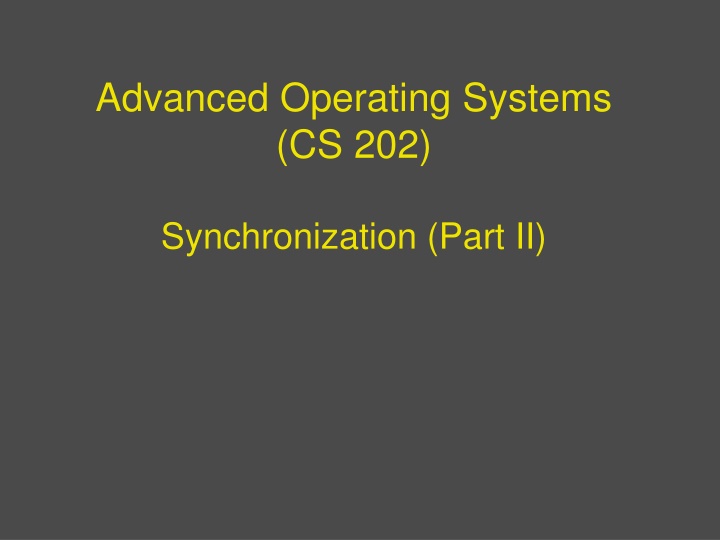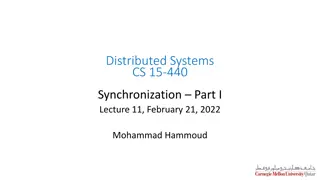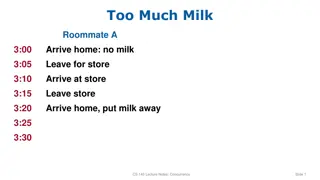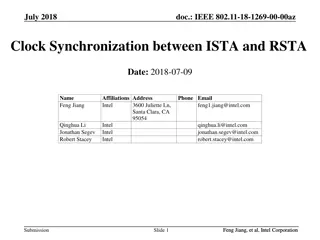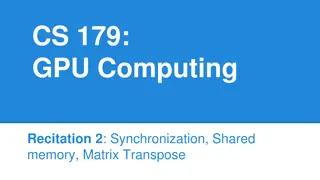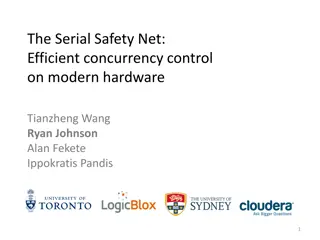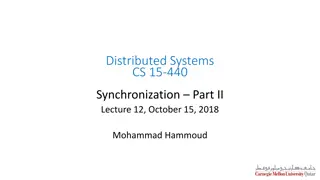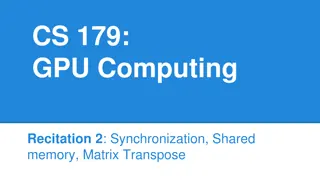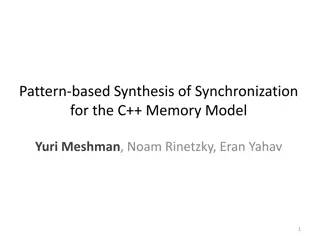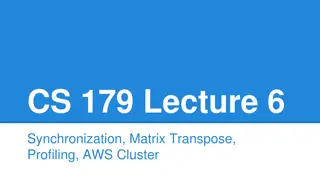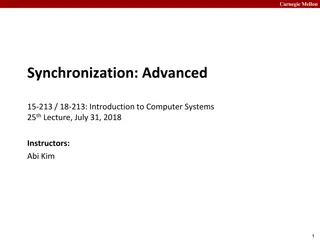Concurrency Sources and Pitfalls in Scull: Understanding Synchronization
Sources of concurrency in advanced operating systems, synchronization pitfalls in Scull, memory leaks, and synchronization primitives like locks and mutexes are discussed in this content of CS 202. Learn about race conditions, protecting shared variables, and different synchronization techniques.
Download Presentation

Please find below an Image/Link to download the presentation.
The content on the website is provided AS IS for your information and personal use only. It may not be sold, licensed, or shared on other websites without obtaining consent from the author.If you encounter any issues during the download, it is possible that the publisher has removed the file from their server.
You are allowed to download the files provided on this website for personal or commercial use, subject to the condition that they are used lawfully. All files are the property of their respective owners.
The content on the website is provided AS IS for your information and personal use only. It may not be sold, licensed, or shared on other websites without obtaining consent from the author.
E N D
Presentation Transcript
Advanced Operating Systems (CS 202) Synchronization (Part II)
What are the sources of concurrency? Multiple user-space processes On multiple CPUs Device interrupts Workqueues Tasklets Timers 2
Pitfalls in scull Race condition: result of uncontrolled access to shared data if (!dptr->data[s_pos]) { dptr->data[s_pos] = kmalloc(quantum, GFP_KERNEL); if (!dptr->data[s_pos]) { goto out; } } Scull is the Simple Character Utility for Locality Loading (an example device driver from the Linux Device Driver book)
Pitfalls in scull Race condition: result of uncontrolled access to shared data if (!dptr->data[s_pos]) { dptr->data[s_pos] = kmalloc(quantum, GFP_KERNEL); if (!dptr->data[s_pos]) { goto out; } }
Pitfalls in scull Race condition: result of uncontrolled access to shared data if (!dptr->data[s_pos]) { dptr->data[s_pos] = kmalloc(quantum, GFP_KERNEL); if (!dptr->data[s_pos]) { goto out; } }
Pitfalls in scull Race condition: result of uncontrolled access to shared data if (!dptr->data[s_pos]) { dptr->data[s_pos] = kmalloc(quantum, GFP_KERNEL); if (!dptr->data[s_pos]) { goto out; } } Memory leak
Synchronization primitives Lock/Mutex To protect a shared variable, surround it with a lock (critical region) Only one thread can get the lock at a time Provides mutual exclusion Shared locks More than one thread allowed (hmm ) Others? Yes, including Barriers (discussed in the paper) 7
Synchronization primitives (cont d) Lock based Blocking (e.g., semaphores, futexes, completions) Non-blocking (e.g., spin-lock, ) Sometimes we have to use spinlocks Lock free (or partially lock free ) Atomic instructions seqLocks RCU Transactions (next time) 8
Nave implementation of spinlock Lock(L): While(test_ and_ set(L)); //we have the lock! //eat, dance and be merry Unlock(L) L=0; 9
Why nave? Works? Yes, but not used in practice Contention Think about the cache coherence protocol Set in test and set is a write operation Has to go to memory A lot of cache coherence traffic Unnecessary unless the lock has been released Imagine if many threads are waiting to get the lock Fairness/starvation 10
Better implementation Spin on read Assumption: We have cache coherence Not all are: e.g., Intel SCC Lock(L): while(L==locked); //wait if(test_ and_ set(L)==locked) go back; Still a lot of chattering when there is an unlock Spin lock with backoff 11
Bakery Algorithm struct lock { int next_ ticket; int now_ serving; } Acquire_ lock: int my_ ticket = fetch_ and_ inc(L->next_ ticket); while(L->new_ serving!=my_ ticket); //wait //Eat, Dance and me merry! Release_ lock: L->now_ serving++; Still too much chatter Comments? Fairness? Efficiency/cache coherence? 12
Anderson Lock (Array lock) Problem with bakery algorithm: All threads listening to next_ serving A lot of cache coherence chatter But only one will actually acquire the lock Can we have each thread wait on a different variable to reduce chatter? 13
Andersons Lock We have an array (actually circular queue) of variables Each variable can indicate either lock available or waiting for lock Only one location has lock available Lock(L): my_ place = fetch_ and_ inc (queuelast); while (flags[myplace mod N] == must_ wait); Unlock(L) flags[myplace mod N] = must_ wait; flags[mypalce+1 mod N] = available; Fair and not noisy compare to spin-on-read and bakery algorithm Any negative side effects? 14
MCS Lock Each node has: struct node { bool got_ it; Next; //successor} Lock(L, me) Unlock(L,me) join(L); //use fetch-n-store remove me from L while(got_ it == 0); signal successor (setting got it to 0) 15
Race condition! What if there is a new joiner when the last element is removing itself 16
From the Boyd-Wickizer et al paper, Non-scalable locks are dangerous CLH and K42 are MCS variants 19
BARRIERS/FYI 20
Barriers 21
Dissemination Barrier (Hensgen/Finkel) 24
